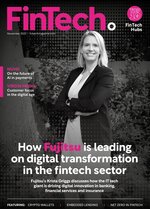How quantum computing could transform the banking sector

Quantum banking is, perhaps, one of the least championed trends within financial services today – yet it still has the potential to have a significant impact on the financial system.
It revolves around quantum computing and blockchain to build a faster payments mechanism that is also cheaper to operate, because it removes the so-called middlemen who have often been needed in traditional peer-to-peer payments.
What is quantum computing and how does it work?
Suhail Bin Tarraf, Group Chief Operations Officer at First Abu Dhabi Bank, says: “Computers today use bits to run operations, however a quantum computer uses qubits to perform multidimensional algorithms in real time. Just like classical bits, a quantum bit must have two separate states: one representing 0 and one representing 1.
“However, a quantum bit can also exist in states of superposition, be subjected to incompatible measurements, and be intertwined with other quantum bits – creating a multitude of unique combinations. The recent developments in harnessing these unique traits makes qubits much more powerful than classical bits.”
Duke Munoz, Sales Representative at TechEniac, continues: “In quantum computing, 0 and 1 can coexist, or even intertwine, leading to a multitude of calculations even with the same input.
“This revolutionary technology has enabled a more secure, efficient, and counterfeit-resistant financial system, making it a promising development in the world of finance.”
Indeed, so promising is it that MarketsandMarkets forecasts the global quantum computing market to reach US$1.77bn by 2026, up significantly from US$472m in 2021, recording a compound annual growth rate in excess of 30%. If adopted correctly, financial services could be one of the biggest proponents of quantum computing, benefitting from this value creation in the process.
Speed a considerable advantage of quantum banking
One of the most considerable advantages that quantum banking provides over alternative methods of banking and moving money is the increased speed. Quantum computing can process data 10 million times faster even than supercomputers, highlighting the astounding capacity that this emerging technology possesses.
The authors of an IBM report into quantum banking explain the technical advantages that lurk beneath the hood: “The solution space of a quantum computer is orders of magnitude larger than traditional computers – even immensely powerful ones. That’s because doubling the power of a classical computer requires about double the number of transistors working on a problem. The power of a quantum computer can be approximately doubled each time only one qubit is added.”
This system in turn provides powerful advantages to financial institutions and other players within the banking space – and it’s not going unnoticed by the industry. A recent report published by Temenos surveyed 300 executives across retail, commercial and private banking around the world. Among other things, it found that 63% of executives thought new technologies – including quantum computing – would have the biggest impact on banks in the next five years, compared to just 34% for the next most popularly cited trend: changing customer behaviours.
This figure is a couple of percentage points lower than it was two years ago, suggesting a slight COVID-19 tempering of expectations, but significantly higher than it was in 2019 – the last full year unaffected by the pandemic – with just 42% of executives surveyed as part of Temenos’ 2019 research saying that these technologies would be the biggest driver of change.
Speaking at the time the research was released, Jonathan Birdwell, Global Head of Policy and Insights for Economist Impact, which conducted this survey on behalf of Temenos, claimed that banks were aware of the onus that these expectations placed upon them: “New technology and customer demands are the top two trends expected to impact banking in the next five years. To maintain their direct connection with the consumer, banks are recognising that they must become true digital ecosystems.”
Risk management among other quantum use-cases
Another significant use-case for quantum banking lies around risk, which continues to be an operational tug-of-war for banks of all sizes. Quantum computing can perform operations magnitudes quicker, meaning complex financial information – such as the data that goes into assessing credit risk, for example – can be analysed quickly and with more accuracy.
A study published earlier this year by Ernest & Young (EY) highlights the complex risk landscape that banks are operating in: it claims that CROs face an extraordinary volume and variety of risks, both traditional and emerging, which all seem to be growing in urgency. Yet their biggest challenge lies in understanding how these risks intersect with each other to create potential points of failure within their organisation, even when traditional risk management metrics look stable.
“Cyber risk is the top risk priority for the next 12 months, according to CROs,” the study says. “But credit risk may soon become more of a focal point if economic conditions worsen.” Clearly, then, this necessitates improved technology to help financial institutions manage the plethora of risks they face on a daily basis. Could quantum banking be a solution?
First-movers will secure an early advantage
Authors of a report from UK Finance previously wrote: “Quantum computing will have applications across financial services, transforming the way we approach investment, risk, AI and security and offering financial services firms that seize the opportunities an early advantage.
“Financial services firms should be considering how they prepare for the quantum computing technology that looks certain to transform the market. Failing to do so risks others developing the ability to move faster in the short term and to attract the resources that will be essential for long-term success.”
Suhail Bin Tarraf, Group Chief Operations Officer at First Abu Dhabi Bank, continues: “Outside of risk management, quantum supercomputing will lead to a range of banking capabilities, such as analysing large areas of unstructured data to make financial predictions or simulate investment portfolios. It will lead to a greater understanding of financial markets and economic booms or busts as well as management of asset allocation.
“Experts believe that the commercialised use of quantum computing is still about a decade away. Scalability, cost, maintenance, legacy technology, and regulatory scrutiny are a few of the challenges in store for banks. However, early movers are likely to have an advantage and the chance for gaining a competitive foothold will not be free for long.”


